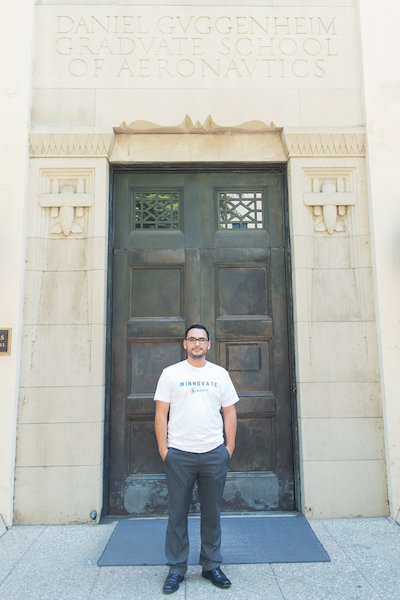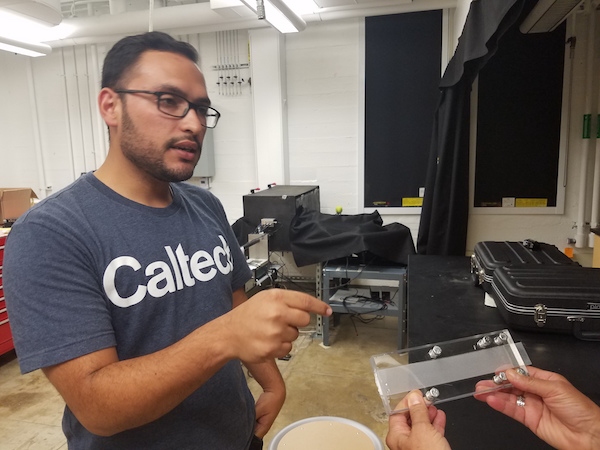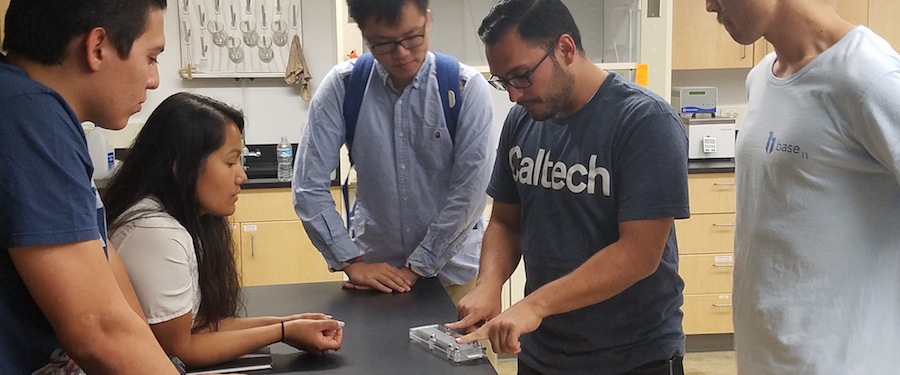Henry Ford College student Hector Ochoa spent the summer of 2016 at Caltech as one of Base 11’s paid fellows. He lived on campus, received mentorship from a grad student, and worked on an aerospace research project. Here, he opens up about the fears he felt about fitting in at such a prestigious university.

Hector in front of the famous Guggenheim building, where he worked in a lab over the summer.
As a kid, I understood the importance of going to college. With an education, I would not only increase my chances of obtaining a well-paid job, but I would also be setting an example that my siblings could follow. One of my dreams was to have an opportunity to experience being a student at a prestigious university like Caltech. That’s why, when I learned about the opportunity to spend the summer there through Base 11, I eagerly applied.
But when I received the email confirming that I would be a Base 11 summer fellow at Caltech, I became nervous. I was afraid that I would not fit into a community of “the best scientists.” I come from humble background, raised by a single mom in Los Angeles, and I was afraid that I would be surrounded by rich students who would stare me down, and students who were smarter and better prepared than I was. I did not know what kind of experiences awaited me, so the time prior to my arrival was scary.
One of the things I did to prepare myself for the experience was reach out to mentors and advisors whom I met throughout my time in college. I wrote a 900-word email explaining all my concerns I had about the summer fellowship at Caltech. In the email, I talked about how I was worried because I got a B on Calculus 2, so I might not fit in. I also told them that I thought it might have been a mistake that I was chosen for the opportunity. I even explained that I was afraid that this experience might hurt me more that it would help, if it turned out I wasn’t the student that Base 11 expected.
My mentors replied to me with very honest messages which I found comfort in. One explained that given the prestige institutions like Caltech hold, it is a great opportunity for me to see if a school with that high of a ranking is over my head or not. Another said not to focus on whether or not I believe I deserve the opportunity, but instead to have gratitude for it. Of course! I wasn’t chosen because I had been born overqualified, but instead I was given the opportunity to intern at a school where I would be challenged. I like to think that Base 11 knows that challenges bring the most growth.
When I arrived at Caltech, the feeling I got from walking around the school was as if I was dreaming. It was surreal to be walking on the campus where a physicist whom I admire, Richard Feynman — who is well recognized for his contributions in quantum electrodynamics — taught and conducted research. This made me happy to be here but also it motivated to be involved.

In the lab, Hector explains the experiments he did with agarose gel samples.
When I met other fellows from the program, I was relieved to find out that they were nice and friendly people. Immediately I made friends. It was a goal of mine to become more social to allow myself to build new connections with the fellows, and because they were so welcoming it was easier than I expected.
I got the opportunity to meet students from countries across the world like England, Sweden, Puerto Rico, Brazil, Colombia and China. There were even students from recognized universities like Yale, MIT and Cambridge. While having conversations with different fellows, I confirmed that many students were smarter than me But I also noticed that there was a lot that I could contribute, which made me proud to be able to keep up with many of them.
As I look back on the fears I feel a bit silly. I made strong friendships at Caltech with people I might have never met if I had not been given the opportunity to participate in the internship. When I asked other fellows, they admitted that they too had similar fears about coming to intern at Caltech. There are many nice people around campus, which was great because it made it easy to worry less about the people and focus on the research project (which was probably more important anyway). With my group we were looking for a method to minimize the bias error that occurs when we use the particle image velocimetry (PIV) technique to study the collapse of bubbles that form from changes of pressure.
In the end, overcoming my fears was very satisfying. It’s amazing to be able to look back on my fears and see how my mind can create barriers that don’t exist. Even though I know I’m not immune to fear, it is nice to know that with confidence and focus I am capable of achieving more than I previously thought. Having to worry less about the fears allows me to spend more energy in learning, therefore enabling me to become a better scientist.
There was nothing anyone could tell me to make my fears go away. But, if I could go back in time, I would tell myself “You are your worst critic sometimes, so take a chance.”
Learn more about the paid summer fellowship opportunities Base 11 offers at Caltech and elsewhere.

